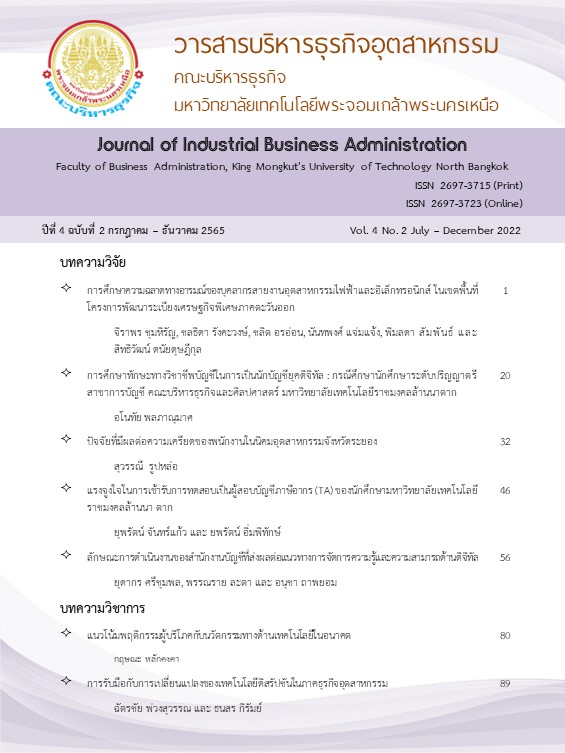A Study of Emotional Quotient of Personnel in Electrical and Electronic Industry in Eastern Economic Corridor (EEC)
Keywords:
Emotional Quotients, Self-Perception, Self-Expression, Interpersonal, Stress Management, Decision Making, Electrical and Electronic IndustryAbstract
The objectives of this research were to 1) study the emotional quotients of the personnel and 2) to compare the difference in the emotional quotients of the personnel by gender, age, working experience, monthly income, and job characteristics. The quantitative data were obtained from 100 employees, who are personnel in the electrical and electronic industry in Eastern Economic Corridor. This research is survey research collected data through questionnaires. The statistics used in the data analysis were percentage, mean, standard deviation. Mean difference analysis by t-test and One-Way ANOVA with statistical significance at 0.05 level.
The results showed that the overall level of opinion about emotional quotients was at a high level. When classifying each dimension, respondents had emotional quotients by self-perception, interpersonal, stress management, decision making and self-expression, respectively. The results of comparison of the differences in mean opinion levels regarding emotional quotients classified by gender, age, working experience and job characteristics no statistically significant difference at the 0.05 level. As for the comparison results of the difference in average level of opinion about emotional quotients classified by monthly income was a statistically significant difference at the 0.05 level.
References
Six Seconds. (2021). [online]. State of Heart Trend in Emotional Intelligence 2021. [cited 14 Aug. 2022]. Available from : URL : https://www.6seconds.org/emotional-intelligence/research/
กรมสุขภาพจิต. (2564). [ออนไลน์]. เปิดผลวัดใจคนไทยช่วงโควิด-19 พบ 4 เรื่องใหญ่. [สืบวันที่ 14 สิงหาคม 2565]. จาก https://dmh. go.th/news-dmh/view.asp?id=31154
Mega We care. (2564). [ออนไลน์]. เทรนด์สุขภาพประจำเดือน สิงหาคม 2564. [สีบค้นวันที่ 14 สิงหาคม 2565] จาก https://www.megawecare.co.th/content/5673
Cigna. (2019). [online]. Impact of Stress on Healthcare Systems. [cited 14 Aug. 2022] Available from : https://www.cignaglobal.com/blog/thought-leadership/ impact-of-stress-on-healthcare-systems
สำนักงานสถิติแห่งชาติ. (2564). สรุปผลที่สำคัญ การสำรวจสุขภาพจิต (ความสุข) ของคนในประเทศไทย พ.ศ. 2563. บางกอกบล็อก.
สถาบันไฟฟ้าและอิเล็คทรอนิกส์. (2565). [ออนไลน์]. ศักยภาพการแข่งขันในอุตสาหกรรมไฟฟ้าและอิเล็กทรอนิกส์ระหว่างไทยกับเวียดนาม. [สืบค้นวันที่ 14 สิงหาคม 2565]. จาก https://eiu.thaieei.com/box/Research/97/ศักยภาพการแข่งขันไทย%20เวียดนาม-ตัด.pdf
Bar-On, R. (2001). Emotional intelligence and self-actualization. Emotional intelligence in everyday life. a scientific inquiry. 82-97.
Cooper, R. K. and Sawaf, A. (1997). Executive EQ: Emotional Intelligence in Business. London: Orion Business Books.
Goleman, D. (1998). Working with Emotional Intelligence. London: Bloomsbury.
Mayer, J. D. and Salovey, P. (1990). Emotional intelligence. Sage. 9, 185-211.
Mayer, J. D., Caruso, D. R. and Salovey, P. (1999). Emotional intelligence meets traditional standards for an intelligence. Intelligence. 27(4), 267–298.
Multi-Health Systems Inc. (2011). [online]. The EQ-I 2.0 Model. [cited] 28 Aug. 2022]. Available from : https://mhs.com/info/taproductresourcecenter-0/
Stein, S. J., Book, H. E. and Kanoy, K. (2013). The student EQ edge: Emotional intelligence and your academic and personal success : Jossey-Bass.
วีระวัฒน์ ปันนิตามัย. (2542). เชาวน์อารมณ์ (EQ) : ดัชนีวัดความสุขและความสำเร็จของชีวิต. พิมพ์ครั้งที่ 2. กรุงเทพฯ : เอ็กซเปอร์เน็ท.
เทอดศักดิ์ เดชคง. (2547). ความฉลาดทางอารมณ์. พิมพ์ครั้งที่ 17. กรุงเทพฯ : มติชน.
วีระวัฒน์ ปันนิตามัย. (2551). เชาวน์อารมณ์ (Emotional Quotien -EQ) : ดัชนีวัดความสุขและความสำเร็จของชีวิต. พิมพ์ครั้งที่ 7. กรุงเทพฯ : สำนักพิมพ์แห่งจุฬาลงกรณ์มหาวิทยาลัย.
Bar-On, R. (1988). The development of a concept of psychological well-being. Doctoral dissertation, Rhodes University, South Africa.
กรมสุขภาพจิต. (2548). อีคิว : ความฉลาดทางอารมณ์. นนทบุรี: สำนักพัฒนาสุขภาพจิต กรมสุขภาพจิต.
Multi-Health Systems (2011)The Emotional Quotient Inventory 2.0: User’s handbook. Toronto, ON: Multi-Health Systems.
สถาบันไฟฟ้าและอิเล็คทรอนิกส์. (2565). [ออนไลน์]. จำนวนผู้ประกอบการและจำนวนแรงงาน. [สืบค้นวันที่ 14 สิงหาคม 2565]. จาก http://www.thaieei.com/eiu/Tableau Page.aspx?MenuID=35
ธานินทร์ ศิลป์จารุ. (2563). การวิจัยและวิเคราะห์ข้อมูลทางสถิติด้วย SPSS และ AMOS. พิมพ์ครั้งที่ 18. กรุงเทพฯ : บิสซิเนสอาร์แอนด์ดี.
รุจิกาญจณ์ เหลี่ยมเจริญ. (2561). ความฉลาดทางอารมณ์ของนิสิตแพทย์ชั้นปีที่ 6 มหาวิทยาลัยนเรศวร. วิทยานิพนธ์ปริญญาสุขภาพศึกษา สาขาวิชาวิทยาศาสตรสุขภาพศึกษา มหาวิทยาลัยนเรศวร.
ทิพประภา พิศาลกิตติคุณ. (2558). ความฉลาดทางอารมณ์ที่มีผลต่อประสิทธิภาพการปฏิบัติงาน กรณีศึกษา ผู้ปฏิบัติงานฝ่ายควบคุมระบบกำลังไฟฟ้า การไฟฟ้าฝ่ายผลิตแห่งประเทศไทย. วิทยานิพนธ์ปริญญารัฐประศาสนศาสตรมหาบัณฑิต สาขาวิชารัฐประศาสนศาสตร์ วิทยาลัยศิลปากร.
อรวรีย์ โคตรเคน. (2560). ปัจจัยความฉลาดทางอารมณ์ของผู้บริหารโรงเรียนที่ส่งผลต่อความสำเร็จในการบริหารงานโรงเรียน สังกัดสำนักงานเขตพื้นที่การศึกษาประถมศึกษานครพนม เขต 2. วิทยานิพนธ์ปริญญาครุสาสตรมหาบัณฑิต สาขาวิชาการบริหารการศึกษา มหาวิทยาลัยราชภัฏสกลลนคร.
พิทยุตม์ บุญอำนาจเดช. (2563). การศึกษาความสัมพันธ์ระหว่างความฉลาดทางอารมณ์ กับอคติในการลงทุน ของเทรดเดอร์รายย่อย ในตลาดหลักทรัพย์แห่งประเทศไทย. การศึกษาค้นคว้าอิสระวิทยาศาสตร์หาบัณฑิต (การบัญชีและการบริหารเงิน) คณะพาณิชยศาสตร์และการบัญชี มหาวิทยาลัยธรรมศาสตร์.
Downloads
Published
How to Cite
Issue
Section
License
Copyright (c) 2022 Journal of Industrial Business Administration

This work is licensed under a Creative Commons Attribution-NonCommercial-NoDerivatives 4.0 International License.



